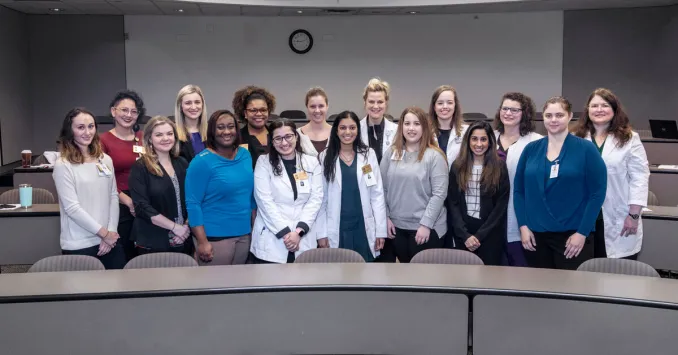Lightbulb Moments: Baylor DNP Students Share the Impact of Course Learnings On Their Current Jobs

We wanted to know if and how Baylor online DNP students were applying course learnings to their current nursing jobs. Here are a few responses from DNP students in our Family Nurse Practitioner and Executive Nurse Leadership tracks that were particularly insightful.
Editor’s Note: Responses may have been edited for clarity and length
Rachael Carmichael, DNP Family Nurse Practitioner
“I'm thankful that the things I learned in school can be directly applied to my work environment. The most exciting, light-bulb moment for me was right after I started school. I was in my first semester and learning about lupus and the way that it affects the heart, specifically the heart valves. Then having a patient not even a week later, who had a history of lupus and had come into the hospital for heart-valve problems.
While the nurse who was giving me a report was saying, ‘Yeah, she's got a history of this and this over here’ in a very disjointed way. The lightbulb clicked for me and I said, ‘Wait, she's got a history of lupus, it's uncontrolled, probably led to this heart-valve issue there, and that's why we're in the situation we're in.’ It was just amazing to start to put those pieces together and encouraging to start connecting those dots.”
Brianna Sanderson, DNP Family Nurse Practitioner
“I work in an intensive care unit at the hospital as an RN and incorporating some of my assessment skills in that setting has been really beneficial. This semester, my assessment skills have been way better.
The other day, for example, I was assessing a patient with very severe cirrhosis, end-stage liver disease, and I have never really been able to assess the liver or palpate the liver properly. Just to be able to assess that on this patient correctly and to be able to pull my other nurses in and say, ‘Hey, look at this, isn't this so interesting and cool?’ And they're like, ‘Yeah, I never really saw that either,’ or ‘felt like that was something that I needed to assess.’
I'm not sure if it is a required thing for an RN, but I definitely think that it will be for me as an NP, to be able to just recognize those findings.”
Learn more about Baylor's Online DNP programs
Kubra Patel, DNP Family Nurse Practitioner
“There's so much learning during the FNP program. So many things that you didn't get to delve into deeper in nursing school, things that you wouldn't have thought about doing. Assessment skills, for instance.
This semester I’m in a Health Assessment course. It makes it so much easier to assess patients as an RN in the clinical setting. I work in the hospital, so I get to take care of cardiovascular progressive care unit patients. These patients come out of having stents placed or out of coronary artery bypass surgeries and things of that sort. It’s vital to be able to do a good assessment, especially a cardiac assessment. I’m able to apply skills I'm learning during the program and see how it impacts actual clinical practice.”
Anam Zendani, DNP Family Nurse Practitioner
“Now that we're in this Advanced Health Assessment course, there've been plenty of situations where what I read in the textbook, I actually saw either in clinicals or at work.
For example, in the cardiovascular lecture, we were learning about the different types of murmurs, from grade one to grade six. I then had a patient, where I was actually able to distinguish, ‘This patient has a grade 5 murmur.’ I was able to palpate the impulses and hear the murmur sound. There's just so many other examples, so, definitely, the learning has correlated with both my work and clinical experience.”
Catherine Winn, DNP Family Nurse Practitioner
“I work PRN at an underserved community clinic which is about 90% Medicaid. The others are probably uninsured patients, and we try to help people get Medicaid if they don't have it.
So, I'm working with a lot of immigrants and migrants. What I learned in the classroom is that I can apply all of that information to my workplace. Whether it is a new assessment finding, how to interact with patients, or how to look at a patient from a holistic perspective and seeing the person as a whole versus just seeing them as a physical being.”
Tami Taylor, DNP Executive Nurse Leadership
“Every class has been relevant to my day-to-day role as a Chief Nursing Officer. I have been able to take what I have learned and apply it all at work.
During the spring semester, we were in the height of COVID. The faculty understood where we are as nurse executives because they themselves have been nurse executives. They understood our roles and the demands we are experiencing at work. They helped integrate our course work and our work to make the class meaningful. We had a course about Resource Attainment and Allocation that semester; and what is more challenging on hospital resources and allocation than COVID? Dr. Bradley and Dr. Haxton held video sessions, and we were able to support, share, and learn from each other.
I also have more clarity of evidence-based practice, and I have been able to take this knowledge and teach our nurses about EBP.”
